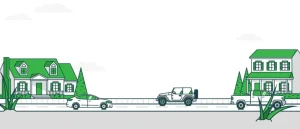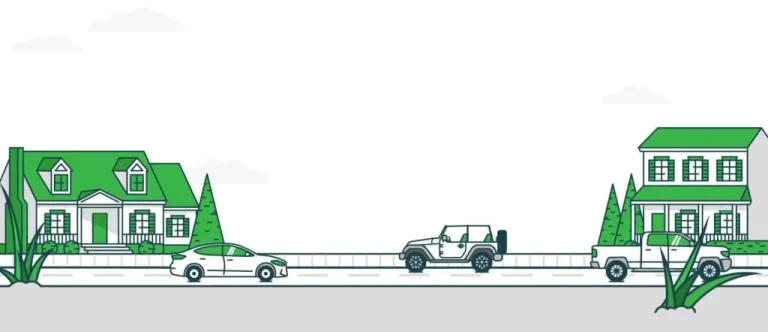Whether you’re planning a cozy mountain retreat to the Blue Ridge Mountains, a beachy escape to the Outer Banks, or a night out on the town in Charlotte, the Tar Heel State has rich experiences at the ready for those with a valid auto insurance policy and some gas in the tank.
It’s essential to note that all drivers in North Carolina must have an active auto insurance policy that meets the state’s minimum requirements, lest they face the consequences of breaking the law. Let’s take a look at exactly what coverages drivers need, how to find a policy that best suits your lifestyle, and how to get the most bang for your buck when it comes to auto insurance so you can save for some new climbing gear or tickets to a tour of the Biltmore Estate.
What You Need to Know About Car Insurance in North Carolina
Whether you’re investigating the insurance companies in North Carolina to find the best for your needs, scouring the web for the cheapest policy in the state, or simply curious about all things auto insurance in the Tar Heel State, give yourself a pat on the back for doing your research. Understanding the ins and outs of auto insurance in North Carolina is the first step to finding the best policy for your needs.
To find the best policy for your lifestyle, you’ll first need to decide what you value most in a policy: cost or coverage. Those who value coverage over cost may be better off with a full coverage policy from an insurer that offers a range of optional coverage options. Conversely, those who value cost over coverage may choose a minimum coverage policy from an insurer that offers premiums far below the state average and plenty of discounts.
Those who can’t compromise on cost or coverage will likely find the best middle ground with a full coverage policy from an insurer that offers several stackable discounts. Sacrificing coverage in the name of savings isn’t always the best idea, even if you’re the best driver in town. Let’s take a look at how you can get the best policy for your needs from one of the top insurers in the state without sacrificing any of your values.
How to Find the Best Auto Insurance in North Carolina
The best North Carolina auto insurance isn’t a one-size-fits-all policy but one that works best for your lifestyle and budget. While every driver is different, and auto insurance is highly subjective, a full coverage policy will often be the best choice due to the sheer amount of coverage it offers.
The best policy for many North Carolinians will come from one of the top insurers in the state, as they often offer the lowest rates for the most amount of coverage, the widest range of coverage options, and many discounts policyholders can combine to lower their premiums even further. A full coverage policy in North Carolina will have liability coverage, uninsured motorist coverage (UM), underinsured motorist coverage (UIM), collision coverage, comprehensive coverage, a first-party medical benefit like medical payments coverage (MedPay), or gap coverage, among other coverages.
While one policy may work best for one driver, it may not be the best for others. Since auto insurance policies are highly subjective and customizable, ensuring your policy best suits your needs and no one else’s is crucial.
What Are the Best Insurance Companies in North Carolina?
The best car insurance companies in North Carolina will range from driver to driver, as auto insurance is highly subjective, but will likely be State Farm, Progressive, or Geico, to name a few. Each insurer offers base rates below the state average for a full coverage policy, scores highly in customer satisfaction surveys, and has many discounts for policyholders to combine.
North Carolina Auto Insurance Requirements
The North Carolina minimum auto insurance requirements mandate drivers have at least $30,000 in bodily injury liability per person, $60,000 in bodily injury liability per accident, $25,000 in property damage liability per accident (30/60/25 liability coverage), and the same 30/60/25 limit for uninsured motorist coverage. Those who lease or finance their vehicles may also need comprehensive and collision coverage on their full coverage policies.
North Carolinians must always carry the minimum amount of coverage required by state law lest they risk the legal penalties associated with breaking the law. Those caught driving without insurance in the state may be subject to fines, fees, license and registration suspension, or even jail time.
Uninsured Motorist Coverage in North Carolina Explained
In North Carolina, the uninsured motorist statute claims that drivers without the minimum amount of 30/60/25 uninsured motorist coverage (UM) are considered uninsured and subject to legal penalties. While only 7% of drivers in the Tar Heel State are uninsured, which is low compared to the national average of 12%, the state still requires drivers to carry coverage to protect themselves against uninsured drivers.
UM coverage acts like a boomerang of one’s own liability coverage. When a policyholder is in an accident with an uninsured driver, instead of invoking the at-fault driver’s liability coverage, as is the practice in other accidents, the policyholder will invoke their UM coverage to receive the same type of benefits that liability coverage offers. UM and liability coverage both offer coverage for medical expenses and vehicle repairs.
What Are the North Carolina Insurance Laws?
In North Carolina, auto insurance laws require all drivers to have a minimum limit of at least 30/60/25 in both liability and uninsured motorist coverages. Any policy with at least those two coverages is considered sufficient in the eyes of the law but may not be sufficient for one’s protection on the road.
In North Carolina, driving without insurance is illegal and punishable by severe consequences. Drivers who fail to maintain legally adequate coverage may face fines, fees, license and registration suspension, or even jail time. The punishment will vary depending on the severity and frequency of the incident, but first-offenders may even face jail time.
Legal penalties aside, it’s expensive to drive without sufficient coverage. If an uninsured driver causes an accident, they may be on the hook for the victim’s medical expenses once the victim maxes out their policy limits. Uninsured drivers may also be subject to a lawsuit from the accident victim, which can get expensive between hiring legal defense and paying for damages.
What’s a DL-123 Form?
In North Carolina, an SR-22 form, or a DL-123 as it’s called in the Tar Heel State, is a form issued to drivers who’ve committed a severe traffic violation, like driving while uninsured or while under the influence. The form is filed on behalf of the driver by the driver’s insurer to verify with the state that the driver possesses a valid auto insurance policy.
While the form itself isn’t expensive, it can cause one’s premiums to significantly increase. The existence of such a form on one’s record signifies to insurers that the driver is at a higher-than-average risk of filing a claim. Thus, high-risk drivers and those with an SR-22 pay higher premiums to compensate for their risk.
Is North Carolina a No-Fault State?
No, there aren’t any laws signifying no fault in North Carolina. Thus, the Tar Heel State isn’t a no-fault state. Instead, it’s a tort state, meaning at least one driver must be considered at fault in every accident. The biggest differences between no-fault states and tort states are how accidents are treated and the minimum coverages all drivers must maintain on their policies.
In North Carolina, PIP insurance or personal injury protection isn’t required or even offered. In most states with no-fault laws, drivers are required to carry a minimum limit of PIP. PIP is an FPMB that drivers invoke to cover their medical expenses in the event of an accident, regardless of who was at fault. Drivers must have PIP in no-fault states because accidents aren’t immediately assessed for fault, so drivers must use their own insurance to pay their medical bills.
What Are the North Carolina Accident Laws?
In North Carolina, car accident laws maintain that at least one driver must always be considered at fault in an accident. North Carolina is a tort state, meaning victims in an accident rely on the at-fault driver for coverage for their expenses following the accident.
Should two North Carolinians get into an accident, the victim of the accident relies on the at-fault driver for insurance coverage for their medical expenses or vehicle repairs. All drivers in the Tar Heel State must carry liability coverage because this coverage will extend to the victim or victims in an accident caused by the policyholder. Those who fail to carry sufficient coverage will be on the hook for the victim’s expenses and any legal penalties they may face.
How to Find Cheap Car Insurance in North Carolina
While the cheapest car insurance in North Carolina may be a minimum coverage policy that meets the state’s minimum coverage requirements but doesn’t exceed them, that may not be the best policy for every driver. One of the best ways to find the cheapest policy that still meets your coverage standards is to research the top insurers in the state.
The cheapest policy in the state may be a minimum coverage policy from State Farm, but several other insurers offer great rates for full coverage policies. In fact, the average premium on a full coverage policy with State Farm is nearly 40% less than the state average. The average full coverage policy in the Tar Heel State costs about $1,340 annually, which is already about 20% lower than the national average of $1,670 annually. It helps, too, that North Carolina is one of the cheapest states in the country for auto insurance.
Another great way to get a cheap policy without sacrificing coverage is to opt for stackable discounts on your policy. Many insurers offer discounts that you can combine to lower your premiums even further. Some common discounts that only require policyholders to meet a set of criteria are a student discount, a bundling discount, or a multi-car discount. Some insurers even offer enrollment-based discounts that require policyholders to play a part in their savings to earn a more significant discount, like a usage-based telematics program or a pay-per-mile program.
What Is the Average Cost of Car Insurance in North Carolina?
If you’re searching for the best auto insurance rates in North Carolina, the average rate to beat is about $1,340 annually. Policyholders who pay less than $1,340 in their annual premiums are getting rates below the state’s average. It’s essential to remember, though, that auto insurance rates are highly subjective and can ebb and flow over time.
Insurers often take into account one’s gender, ZIP code, driving record, age, and insurance history, among several other factors, when considering a driver’s premiums. These factors allow insurers to ascertain the risk they take by binding a policy with a driver. If a driver is at high risk of filing a claim, their premiums may be higher than average.
More About North Carolina Car Insurance Rates
While North Carolina car insurance rates are highly dependent on the individual, they also depend on statistics about drivers in the state. States that have a high population, high population density, or a high population of uninsured drivers generally have auto insurance rates above the national average.
The average full coverage policy in North Carolina costs about $1,340 annually. The national average full coverage policy costs about $1,670. So, it’s safe to assume that the population of the Tar Heel State isn’t affecting the average cost of insurance in the state.
Who Has the Cheapest Car Insurance in North Carolina?
While the average cost of car insurance in North Carolina is about $1,340 annually for a full coverage policy, such a policy with State Farm costs about $840 annually, or about 40% less than the state average. For many drivers, State Farm will have the cheapest policies. It’s crucial to note, though, that auto insurance rates fluctuate based on the driver, and some drivers may not be eligible for such low rates.
How to Get Car Insurance Quotes in North Carolina
Whether you’re on the hunt for cheap auto insurance in North Carolina, unsure that you’re getting the best bang for your buck with your policy, or simply curious about the types of policies you may qualify for, the best way to see all your options is to get and compare quotes online. By getting and comparing quotes online, you can find a policy that matches your lifestyle and fits in nicely with your budget.
You’ve come to the right place for quotes, you lucky duck. Here at Clovered, we pride ourselves on our free quoting tool, which you can use to access your quotes in minutes. If you’d rather speak with an agent, we have those, too. You can contact one of our licensed agents at 833-255-4117 or agent@clovered.com.
The editorial content on Clovered’s website is meant to be informational material and should not be considered legal advice.




